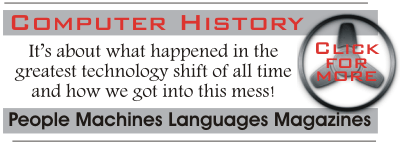| The Web - The Early Years |
| Written by Historian | |||||||
Page 3 of 3
Microsoft joins inIn 1995, Netscape released Navigator 2 and Sun released Java – only now did Microsoft wake up to the fact that it was being left behind. For reasons that we have to guess at, Microsoft had convinced itself that the Internet was a passing fad and one that it could sweep aside by establishing its own network – MSN (MicroSoft Network). An MSN client was included in Windows 95 and while it might have looked like a Web browser the technology was non-standard and not based on HTML. It can best be described today as an example of a connected App. You ran it on your desktop and it gave you access to pages of information that Microsoft provided. Microsoft believed that MSN and the Internet could coexist and users would subscribe to MSN because it provided content that was way beyond what you could get on the Web. It didn’t take long, however, for Microsoft to realise that there was the Web and then there was MSN and most users wanted the Web. The Browser WarsIn a rapid response that many interpreted as desperation Microsoft released Internet Explorer 1. By 1996over 75% of Web users were using Navigator and, as Explorer 1 wasn’t very good, it didn’t seem likely that Microsoft would regain the ground that it had lost by ignoring the Internet. But everything with Netscape wasn’t quite as wonderful as it seemed. Microsoft was giving Explorer away with no ifs or buts. It was straightforwardly free no matter who you were or what you were using it for. Netscape Navigator on the other hand was free if you were a student but otherwise it cost something. There was always a free beta to download if you didn’t want to pay for the real thing. If you did pay up then the bad news was that Netscape continually changed its pricing policy and it was inconsistent – a way to irritate your paying customers if ever there was one. This was the start of era that saw a new beta every three months and the use of the Web and its users as a huge pool of software testers. It was also the start of the Web as a software-marketing tool. Netscape’s management was also convinced that its product was better and had such a huge market lead that there was nothing it need do to ensure it kept that lead. Microsoft on the other hand had Bill Gates to drive it to eventual success. Explorer came with Windows and remained free. Version 3 was a lot better than 1 and it introduced lots of new technology, including ActiveX. Microsoft attempted to push things so fast that it pre-empted standards and tried to establish its own technology as the de-facto standards. The reason for the panic is the recently resurrected idea that a Web browser could rule them all.The Web mania was gripping everyone so much that it seemed entirely likely that a browser might well usurp Windows as a the most popular operating system. A browser could run programs in the form of Java Applets and it, in theory at least, didn’t need an operating system. Any machine plus a browser was complete in itself and the distinctions between Windows, Linux, Unix or whatever would vanish. This clearly was not a nice prospect for Microsoft and so it innovated to produce not only a better browser but a Windows-specific browser. With the overwhelming success of Explorer the idea that a browser was and is all you need more or less faded from the consciousness of Microsoft and very nearly everyone else - but it is still just as true and Chrome OS is proof that you don't need a traditional OS at all. Of course in this case Chrome OS has Linux hiding underneath but as far as the user is concerned its all browser. Netscape lost market share and was eventually bought by AOL. Meanwhile Microsoft integrated the browser so closely with Windows that it invented the “Active Desktop” in which the desktop became a browser. Other new ideas, most of which died a death, were “push” - the ability of servers to send data that clients never requested, and channels - a move to the TV model for the browser. Users seem to have resisted all attempts to turn the Web into something passive and simply a marketing tool. Still Microsoft’s attempts to make the Web central to Windows eventually landed them in court for anti-competitive practices. TodayDespite all of the hype about new technologies the web today is surprisingly much like it was soon after its invention. Things have been improved - better HTML, more JavaScript, more sophisticated browsers. Even though there have been and still are attempts to reinvent or replace the web nothing has revolutionised the original revolution. The web is still mostly pages connected together by hyperlinks and the things we complained about then are mostly what we complain about now. If there is a single big difference it is the growth of ecommerce. Where once we surfed to find out we now surf to buy out...
More InformationWorldWideWeb: Proposal for a HyperText Project Related ArticlesTim Berners-Lee Awarded Turing Prize 30 Years Ago World Wide Web Released Into Public Domain Queen Elizabeth Prize For Engineering Recognizes Internet and Web World Wide Web's 30th Anniversary (2019) CERN Celebrates 20 Years of World Wide Web To be informed about new articles on I Programmer, sign up for our weekly newsletter, subscribe to the RSS feed and follow us on Twitter, Facebook or Linkedin. {loadposition comment
<ASIN:0882952307> <ASIN:0789736268> <ASIN:0684832674> |
|||||||
| Last Updated ( Monday, 08 May 2023 ) |

